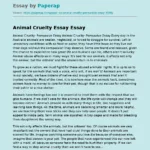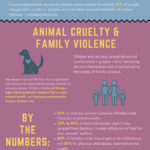In the realm of scientific research, a contentious issue lurks beneath the surface: the ethical implications of using animals in experiments. This dilemma casts a long shadow over a wide array of disciplines, from biomedical research to psychological studies. As scientists grapple with the necessity and ethicality of animal testing, the public discourse surrounding this topic is increasingly polarized. This article delves into the multifaceted nature of this issue, exploring the conflicted emotions, the ethical frameworks at play, and alternative methods that could mitigate the reliance on animal subjects.
The emotional response to animal research is often visceral. Many individuals perceive a profound moral obligation to protect sentient beings, prompting outrage against practices deemed cruel or unnecessary. This instinct stands in stark contrast to the utilitarian perspective that evaluates animal testing through the lens of potential human benefits. Those advocating for the necessity of animal research argue that it has been instrumental in developing life-saving treatments and understanding complex biological mechanisms. However, reconciling these opposing viewpoints remains an arduous endeavor for many.
At the heart of this discourse lies an intricate ethical landscape. The principles of ethical frameworks such as utilitarianism, deontology, and virtue ethics contribute to the ongoing debate. Utilitarianism posits that actions are justified if they maximize overall happiness or minimize suffering. Proponents of animal research often invoke this argument, citing the potential human advancements that may arise from their work—vaccines, surgical techniques, and treatments for chronic diseases, to name a few.
Conversely, advocates against animal testing may align with deontological principles, asserting that certain actions—in this case, inflicting pain on animals—are inherently wrong, regardless of the outcomes they produce. This perspective views veterinary care, humane treatment, and non-invasive research methodologies as paramount. To reconcile the two positions, there is a growing emphasis on the need for transparency and accountability in scientific research, which can help foster public trust and support.
To further complicate matters, the notion of speciesism—discrimination based on species membership—pervades the conversation about animal testing. This ideology posits that assigning different moral values to humans and non-human animals is fundamentally flawed. Many argue that if a research method leads to suffering or death, it should not be employed—regardless of the potential scientific benefits.
Moreover, the impact of cultural context cannot be dismissed. In societies where traditions and practices are intertwined with the use of animals, differing opinions on their treatment in research can vary widely. Cultures that hold a deep reverence for animal life may find the justification for testing especially contentious, while others may view it through a lens of scientific advancement and societal progress.
In response to ethical concerns, researchers are actively seeking alternatives to animal testing. The advent of in vitro techniques, organ-on-a-chip technologies, and computational modeling represents a significant shift in the quest for viable research methods. These innovations challenge the necessity of animal subjects, permitting the exploration of biological processes without imposing suffering on living beings. For instance, human cell cultures and advanced imaging systems allow scientists to study disease pathogens while minimizing direct interaction with other species.
Nevertheless, the transition away from animal testing is fraught with challenges. Regulatory agencies often require animal data before approving new drugs or therapies, creating a paradox where scientists feel compelled to engage in research practices they may personally oppose. Furthermore, the translation of findings from non-animal models to effective human treatments remains a contentious issue—questions surrounding the efficacy and relevance of alternatives persist, complicating the dialogue around phasing out animal use.
Environmental concerns also intersect with the conversation about animal testing. The ecological implications of breeding and maintaining laboratory animals, in addition to the production waste generated from such facilities, warrant scrutiny. As discussions surrounding sustainability and environmental ethics gain traction, the argument emphasizes the importance of minimizing animal suffering while simultaneously addressing broader ecological impacts.
Beyond the scientific community, public awareness and perceptions play an integral role in shaping attitudes toward animal research. Educational initiatives that highlight the ethical ramifications and scientific alternatives can help inform the general population. Increasing familiarity with the complexities of this issue prompts individuals to engage thoughtfully rather than react emotionally to provocative headlines. It is essential to foster critical dialogue that encompasses varied perspectives and encourages empathy for both animals and human health.
In conclusion, the conundrum of animal testing within scientific research is a multifaceted issue that elicits strong emotional reactions and ethical considerations. As society strives to find common ground, it is clear that a collaborative approach is necessary for progress. Engaging researchers, ethicists, and the public in meaningful conversations will pave the way towards innovative alternatives, reassessments of regulatory frameworks, and ultimately, a research landscape that honors both scientific inquiry and animal welfare. Understanding the nuances of this debate is essential for navigating the future of science while maintaining the commitment to compassionate treatment for all living beings.









